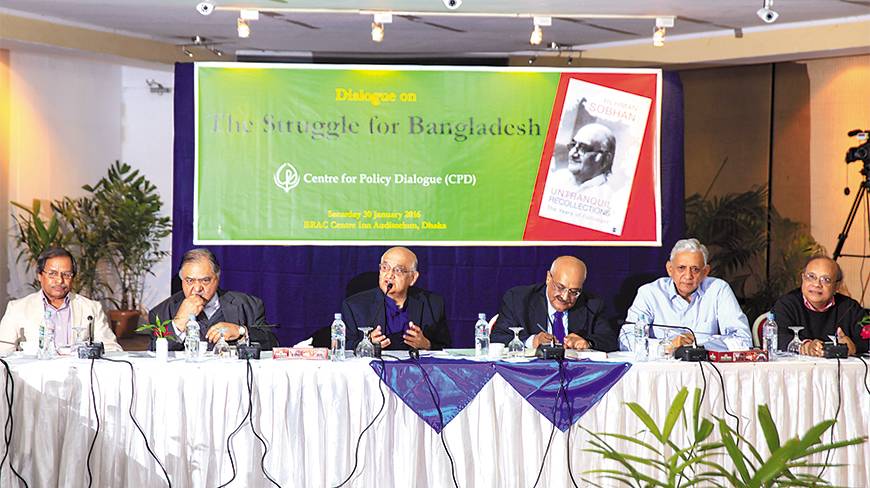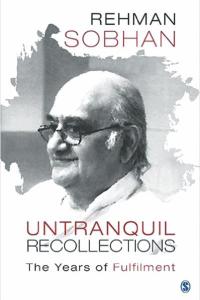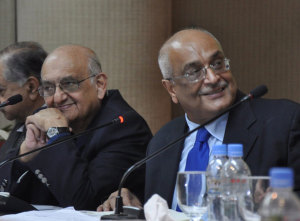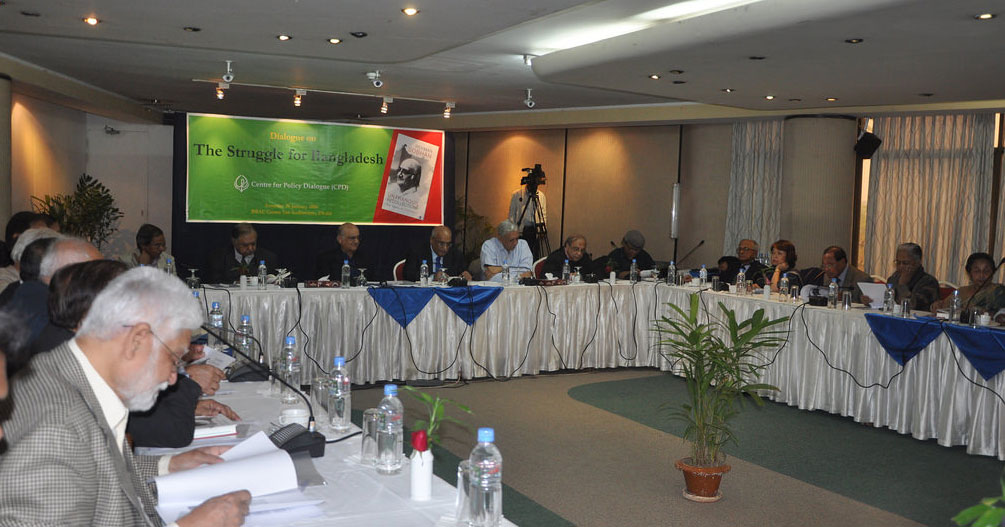

Though it is a personal history, the memoir Untranquil Recollections: The Years of Fulfillment by Professor Rehman Sobhan describes the history and philosophy of the liberation war of Bangladesh with much understanding of the state of the political economy of the country at that time. Besides, the University of Dhaka should reclaim the tradition of contributing to the national commitment and crisis, observed by the discussants at a dialogue organised by Centre for Policy Dialogue (CPD).
Eminent citizens of Bangladesh attended the CPD dialogue on “The Struggle for Bangladesh” held at BRAC Centre Inn Auditorium, Dhaka on Saturday 30 January, 2016 where the contemporary issues of the country came under discussion in the light of the history of our liberation narrated in the memoir by Professor Rehman Sobhan, Chairman of CPD.
Anchored by CPD Distinguished Fellow Dr Debapriya Bhattacharya, the discussion evolved around various themes of the book where it was mentioned that teachers and students of this country have a great history of contributing to national commitments with values and ethos of independence.
Professor Syed Manzoorul Islam, Department of English, University of Dhaka highlighted the literary aspect of the book with a brief mention of political engagement of students of the University of Dhaka at that time. Professor Sobhan’s practical engagements with Bangladeshi culture, education, philosophy and struggle are described in the book which, according to Professor Islam, is a unique piece of literature. The narrative is not only about the author’s personal history, it also provides the culture and history of our nation. Professor Sobhan is someone who is inseparable from the growth of Bangladesh and the struggling tenure of our independence, he remarked.

Dr Sultan Hafeez Rahman, Executive Director, BRAC Institute of Governance and Development (BIGD) discussed the author’s role in addressing the issue of economic disparity between the then two parts of Pakistan. He commented that the depiction of the liberation struggle with proper understanding about the political economy of a state is noted in this book very specifically. Professor Sobhan’s “carefully considered choice” of coming to Bangladesh and staying here has benefitted the country in many ways, he observed.
Professor M M Akash, Department of Economics, University of Dhaka noted that this book is not only an autobiography, it is also a compilation of history where the birth of our nation is very neatly described both from economical and geo-political aspects. Professor Sobhan contributed not only to the liberation movement but also tried to spread out the philosophy of freedom among the common people of this country, he added.
Dr Gowher Rizvi, Foreign Affairs Adviser to the Hon’ble Prime Minister discussed the contribution of Professor Sobhan towards building support of the international community for the independence of Bangladesh. He remaked that the author’s initiatives to seek support from India, Paris, London, Washington, Ottawa speeded-up the liberation process.
As a direct student of Professor Sobhan Mr Mujahedul Islam Selim, President of Communist Party of Bangladesh (CPB), said “Sir was the bridge between our academic pursuit and activism which is almost rare in universities now-a-days.” His lectures were not only limited within the four walls of our classrooms, post-lecture discussions at Madhu’s Canteen was a regular phenomenon at that time, he mentioned.
Dr Kamal Hossain former Minister and President of Gono Forum described the book as a must read for the next generation of the country to learn about some of the rare historical evidences and core philosophy of independence. Mentioning that the history of Bangladesh is in fact a legacy of the student movements he said, the University of Dhaka should be in the leadership role, like before, in dealing with national crisis as and when it arises.

In his concluding remark Professor Sobhan said that there was a market demand for economic rights of the people of East Bengal which was neglected by the then ruling power. “Bangabandhu Sheikh Mujibur Rahman picked-up that issue and we used to have regular discussions on this.” Exemplifying Bangabandhu he also said, Influencing leadership must really have a felt need for ideas and must know how to go on with these ideas and use them. This ideology should be followed by the next generations of this country, he added. CPD Distinguished Fellow Dr Debapriya Bhattacharya termed Professor Sobhan as the first “Public Intellectual” of the country.
Barrister Moudud Ahmed, Member of National Standing Committee of Bangladesh Nationalist Party (BNP), Dr Akbar Ali Khan, Former Advisor to the Caretaker Government, Ambassador Shamsher Mobin Chowdhury, Former Foreign Secretary, Dr Badiul Alam Majumdar, Member Secretary of SHUJAN, Comrade Khalequzzaman, General Secretary of Socialist Party of Bangladesh, Ms Rasheda K Choudhury, Member of CPD Board of Trustees and Executive Director of CAMPE, Mr Abul Hasan Chowdhury, Former State Minister of the Ministry of Foreign Affairs, Professor Rounaq Jahan, Distinguished Fellow of CPD, Mr Mofidul Hoque, Director of Sahitto Prokash also spoke, among others.


